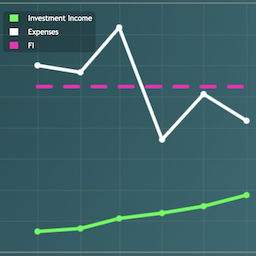Out of all the episodes of the Financial Independence Podcast, this is the one I wish I heard when I was on my journey to financial independence
Bill Perkins, author of Die with Zero, joins Chris Hutchins on the All the Hacks podcast to discuss what money is really for – maximizing net fulfillment.
This interview is incredible, so I reached out to Chris to ask if I could share it with you all, and thankfully he agreed!
Listen Now
- Listen on Spotify or Apple Podcasts
- Download MP3 by right-clicking here
Highlights
- Why you should maximize for net fulfillment rather than net worth
- When is the best time to allocate money to get the most fulfillment
- Why you should time bucket your experiences instead of having a bucket list
- How to break out of earning-saving-investing autopilot
- Why you should fear wasting your life more than running out of money




Outstanding thinking from Mr Perkins! Thank you for sharing!
Die With Zero changed my life. I listened to Bill’s book last year and since then I have totally updated my financial plan for life. This perspective helped me align my saving and spending habits. Last month, my wife and I took all three kids, one grandson and one mother-in-law to Florida for a week and spent hard-earned money the way it should be spent.
This fall, my wife and I will be on a 9-day cruise in the Greek islands. By planning to “Die with Zeo” we will be pursuing world travel while we are still young enough to enjoy it!
this was exactly what i needed to listen to! Really excellent. Thank you!
I usually have a shortish attention span when it comes to podcasts, but this one held me the end (which is saying something at over 1.5 hours!) I did have a minor objection to the part where they were talking about FIRE. It’s pretty obvious that he doesn’t have a deep understanding of what FIRE is and how varied it can be between adherents. But I get it, he has to differentiate himself somehow to add value to what he’s saying, and there was plenty of value there. I had several “aha” moments throughout, and now I’m definitely going to start planning my trip to St. Barts! :) Thanks for the heads-up on the post. Glad to see my email still receives your notices!
No transcripts anymore? :-(
Sad for me as well, I have always read the transcript on Kindle.
I also came here looking planning to read the transcript!
You can find a transcript in the spotify podcast.
Thank you.
Perfect Guest for your show. “Die with Zero” is an important book and ties in nicely with Vicki Robbin’s “Your Money or Your Life”. Perfect for the FI crowd even though the author brushes the fire movement off in his book. Bravo Brandon!
FYI. My journey.
Jack
https://401kspecialistmag.com/maximize-outcomes-not-incomes-die-with-zero/
I’m going to have my husband listen to this. It’s fantastic. Love the concept of memory dividends. Thank you for sharing.
+1 for transcripts
Another vote for transcripts. I just retain better when I can read, take notes, digest and reflect. Hope you’ll update this particular episode again with a transcript. Much appreciated!
People with chronic medical conditions cannot purchase long-term healthcare insurance in the United States. I’m single, 60, and quit working at 53. I’ve had several friends who had parents or spouses deal with serious mental and physical health issues that Medicare wouldn’t cover. They burned through huge amounts of money securing home health aids, or paying $6,000 or more per month for a room in an assisted living facility. This is one of my biggest stressors at this stage of my “ER” life. It’s unlikely I’m going to have a partner to be my care manager as I age.
Transcript please.
I disagree with Bill on the price of long-term care insurance. Bill is so dismissive and wrong on this topic. The cost of long-term care is insignificant for him as a billionaire. Yes, LTC insurance is “cheap” for him. But, if you aren’t a multimillionaire or billionaire, LTC is not cheap. As those of us with a loved one with dementia know, meaningful LTCI is impossible to get if you have a significant medical condition and one or more parent previously diagnosed with dementia. The only option for LTCI that my husband and I had (given my husband’s medical history and my MIL’s dementia) was to buy through his employer for $167/month starting at age 45 with a lifetime maximum payout of $300,000 (no inflation adjustment). In almost all circumstances, we are better off saving that $167/month into a taxable brokerage instead of buying LTC. Plus, $300k is likely to be a drop in the bucket by the time we need LTC.
The cost of memory care is already very high (roughly $8-12k per month, depending on the facility), and the average woman with dementia needs care for 5 years. The average man with dementia needs care for 3 years. Medicaid won’t cover the costs of care until you have exhausted your assets and (in most states) your spouse’s assets. My MIL is 72 and has stage 6 Alzheimer’s, will be moving into memory care within the next 6 months, and lives in a state where a spouses assets are counted for the purposes of Medicaid qualification. My FIL is 73 and has a family history of living into their 90s so he needs to fund an additional 20+ years of his own retirement plus her care. He currently has roughly $1.2M in assets, not including his house. If he spends down his assets for my MIL’s care, he will be destitute in his old age. Its not unreasonable for FIRE people to set aside a large fund to pay for LTC, and Bill’s book and attitude are VERY dismissive on this topic because for Bill, $9k per month is less than his average current monthly spending.
Despite being in finance, Bill also doesn’t seem to understand that the 4% rule is not an asset preservation rule. I don’t think it helped that in this case that Chris is also not really a FIRE person so he couldn’t call Bill out on his misunderstanding. In the worst case SORR, 4% will result in a ending net worth of zero or worse and does not preserve the initial investments. No one in the FIRE community says that you can’t spend more than 4% plus inflation if you find yourself in a good SORR. And, in fact, many people in the FIRE community plan to implement something like Kitces’ ratcheting withdrawal rates.
Many FIRE people also plan on some version of Bernicke’s Reality Retirement Plan, which recognizes the so called, “go go, slow go, and no go years” or the “retirement smile.” That’s built into FireCalc, which many people use to check how safe their retirement plan is.
It also seems like neither Chris nor Bill have heard of the newer versions of FIRE like CoastFI or SlowFI and assume that everyone lives like a monk (a la Early Retirement Extreme) while saving for FIRE, when there are plenty of us out there who believe in the maxim of “build the life you want, then save for it.”
I read Perkins’ book “Die with Zero,” and found some points interesting; however, his credibility and insights are sorely undermined by precisely what you point out, Megan — his facile assumption that LTCI answers the healthcare problem. Future healthcare costs are an extremely worrying concern for many Americans, and it is simply absurd to (rationally) conclude “buy LTCI and be done with it … now, spend down to zero!” I researched LTCI myself, and came away aghast at the ability of companies to increase premiums/change coverage after the contract has already started. What’s the point in forking over all that money just to find the protection was merely an illusion … and an expensive one at that? Admittedly, it’s a hard nut to crack, but ignoring reality in order to make a book tidy is disingenuous. I’m not sure I can stomach the podcast, but will give it a try ….
Definitely agree
Honestly, I loved the book (with some obvious misses on author’s part that folks already pointed out, like yes, long-term care insurance is not cheap for an “ordinary” person, especially early retiree). However, I absolutely HATED the podcast. I’m glad Brandon wasn’t the one interviewing him. All the cursing and absolutely dismissive rude attitude was very ofputting to me. He basically called everyone that disagrees with his point of view f-ing idiots, etc. My least favorite podcast.
The book however is brilliant, less rude and less dismissive. If you liked the podcast, read his book. If you hated the podcast, still read his book. BTW, it’s available in my local library as an audiobook, 5+ hours. I finished listening to the actual book. Much better use of time than listening to his F-bombs in the podcast.